|
Some Blogs
 Daruma
Jiun Onko
1718–1804
The Written Image
|
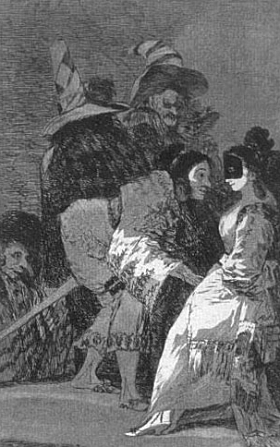 Goya
30 March 1746 - 16 April 1828
______________________________________
"Our fine arts were developed, their types and uses were established, in times very different from the present, by men whose power of action upon things was insignificant in comparison with ours. But the amazing growth of our techniques, the adaptability and precision they have attained, the ideas and habits they are creating, make it a certainty that profound changes are impending in the ancient craft of the Beautiful. In all the arts there is a physical component which can no longer be considered or treated as it used to be, which cannot remain unaffected by our modern knowledge and power. For the last twenty years neither matter nor space nor time has been what it was from time immemorial. We must expect great innovations to transform the entire technique of the arts, thereby affecting artistic invention itself and perhaps even bringing about an amazing change in our very notion of art."
-- Paul Valery, Pieces Sur L 'Art, "La Conquete de l'ubiquite," Paris.
prefatory to The Work of Art in the Age of Mechanical Reproduction
Walter Benjamin
______________________________________
Pictures and power
David Hockney
The church had social control. Whoever controlled the images had power. And they still do. Social control followed the lens and mirror for most of the 20th century. What's now known as the media exert social control, not the church, but we are moving into a new era, because the making and distribution of images is changing. Anyone can make and distribute images on a mobile phone. The equipment is everywhere.
We do not have debates about images. The world of art is separate from the world of images, but the power is with images, not art. An obvious problem is seen. The world of images claims a relationship to visual reality - television and cinema - but this claim cannot now be sustained. We will get more confused if we don't think about them.... (more)
______________________________________
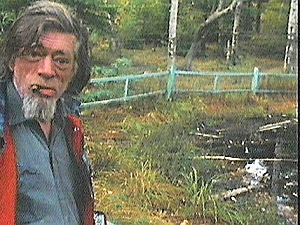 Milton Acorn
March 30, 1923 - August 20, 1986
from
The Dolphin Knight
Milton Acorn
Would not one who changed less finally - dare more?
It's a matter of becoming accustomed to change
And changing as we wish, not in the darks of wishless engines;
Who, creatures of perverted wishes - often perverted
wishes
Give rise in turn to more perverted wishes
Til the balls manipulate the juggler, the engine
cuts off the human head;
Sets it on itself to operate without human juices ...
Altho
This is actually an analogy:
The body simply fades, becomes of little account
And the head of the machine man, in turn
Is reproduced in countless duplicates
To set, complete with thoughts, upon the necks
of his countless slaves.
But isn't this a matter of degree? You and I
Don't our brains - their parts wave like seaweed -
sparkle with energy
In conversation, work, play, all deeds of ecstacy?
And are not matter and energy the same?
Does not your word gathered in the energies of your brain
Make a little shift to become your voice
Another little one to become what I hear, to become
what whirls in my brain
And what I answer - isn't that part of yourself thrown
back at you
Out of part of yourself? Are not we two one?
Ourselves an analogy for Humanity?
The Dolphin knight, elected king for a day
Or for whatever role in which he is still king
Lives whole lives, entire lifetimes
In a world that's all his til the next celebration
When he comes into another's world, knows the whole
content of another's life :
Thus all are one because each one is one
As a strangeness but not a stranger; not as a Human
stuck up like a bowling pin.
If we could be that, so of each other, for each other;
Willing to let another's thoughts be blood
And drip into our nerves as into veins
Would there be any end to us, in space or time?
... (more)
______________________________________
 Goya
Goya at the Arno Schmidt Reference Library)
Desastres de la guerra (10.6 M) (PDF)
Caprichos (10.0 M) (PDF)
______________________________________
classroom as kiva
Al Filreis
During the era since the emergence of digital media and, now or very soon, of ubiquitous connectivity—-and as the effect of these advents on the delivery of materials to the classroom but also their storage outside such a space becomes profound—-the irony of the classroom lecture on modernism has become more obvious than before and increasingly disabling.
I want to explore that irony and lament the disability.... (more)
______________________________________
That Socratic Thing You Do
Gary Norris
DagZine
I open Ludwig Wittgenstein's Culture and Value and straightaway find this recollection from 1930: "The earlier culture will become a heap of rubble and finally a heap of ashes, but spirits will hover over the ashes." (It sounds so much more awesome in the German, let me tell you.) Poems will become ashes in the rubble and mess of earlier culture or hopelessly squeezed deep within poorly indexed archives, robbed of context (or, as I like to imagine these fabulously freed documents, free radicals,) but the poetry will endure as a plurality.(...)
I do believe something engaging and perhaps significant can develop out of thinking about Socrates's refusal to defend himself. He transforms the concept of defense from a simple, though often eloquent, act of verbal communication--in his case, a legal argument that would serve as his defense--into an act of civil disobedience that is meant to allow his life and its work in communion with all his fellow citizens to speak for itself.
So, we ask What is left behind us that matters? I am sorry, but it cannot be "the poems"; I do believe it is the spirits that are left hovering: bodiless, without pleasure or pain.... (more)
______________________________________
One Sun Roaring
Jordan Davis reviews The Collected Poems of Philip Whalen
Between the scarcity and the word-of-mouth publicity, incredibly enough, there came to be loud public demand for a work based entirely on the sensation of coming and going.
______________________________________
... nobody reads a poem about Lacanian theory the same way one reads a poem about the poet's dead child. Any elegist must confront this fact.
In Memoriam
David Orr reviews Elegy: Poems. By Mary Jo Bang.
Graywolf Press
This is a tightly focused, completely forthright collection written almost entirely in the bleakest key imaginable. The poems aren’t all great, some of them aren’t even good, but collectively they are overwhelming — which is both a compliment to Bang’s talent and to the toughness of mind that allowed her to attempt this difficult project in the first place.(...)
Bang proves in this sad, strange book, the conversion of grief into art may be balanced, if not redeemed, by the transformation of art into grieving.
______________________________________
 Goya ______________________________________
Knowing I Live in a Dark Age
Milton Acorn
Knowing I live in a dark age before history,
I watch my wallet and
am less struck by gunfights in the avenues
than by the newsie with his dirty pink chapped face
calling a shabby poet back for his change.
The crows mobbing the blinking, sun-stupid owl;
wolves eating a hamstrung calf hind end first
keeping their meat alive and fresh...these
are marks of foresight, beginnings of wit;
but Jesus wearing thorns and sunstroke
beating his life and death into words
to break the rods and blunt the axes of Rome:
this and like things followed.
Knowing that in this advertising rainbow
I live like a trapeze artist with a headache,
my poems are no aspirins...they show
pale bayonets of grass waving thin on dunes;
the paralytic and his lyric secrets;
my friend Al, union builder and cynic,
hesitating to believe his own delicate poems
lest he believe in something better than himself:
and history, which is yet to begin,
will exceed this, exalt this
as a poem erases and rewrites its poet.
.....................................................................
Milton Acorn: In Love and Anger Richard Lemm google book
"For My Own Damn Satisfaction":
the Communist Poetry of Milton Acorn
James Doyle
In Love and Anger: Milton Acorn - Poet
National Film Board
Canadian Political Poets: Milton Acorn And Robin Mathews
Ron Dart
______________________________________
 shoe tree
lanark highlands
photo - mw ______________________________________
`Piles to Drive into the Quaggy Past'
Patrick Kurp on Basil Bunting
“Peewit and curlew, clint and gryke, bear garlic and may, glishy slutch and Roman Wall – these are certainties of the music. From these come variations and descant, one human being to another.”
Not Finnegans Wake but Jonathan Williams on Basil Bunting, a pastiche of Bunting’s idiosyncratic language and themes. No 20th-century poet’s work is more pleasurable to read aloud, to relish on the tongue, lips and palate. Concision is his engine, accounting for the preponderance of monosyllables and rare words. Who doesn’t enjoy saying clint, gryke and glishy slutch? ... (more)
 Rocs
Tonatiuh Ambrosetti
______________________________________
John Ashbery, a poet for our times
Stephen Burt
Times Online
The great inventor of a style fluid enough to reflect our uncertain times, a helpless symbol of those times, an incomprehensible hoax, a clear-as-glass poet of loneliness and dejection, the greatest living Surrealist, the last Romantic, a frequent influence on poets much younger than he: since 1975, when his Self-Portrait in a Convex Mirror won almost all the awards a book of American poems could win, readers and reviewers have bestowed on John Ashbery all these labels. Meanwhile Ashbery – born in 1927 – has gone on writing his poems, and writing them faster than most of us can read them.(...)
The last figure whom half the English-language poets alive thought a great model, and the other half thought incomprehensible, was probably T. S. Eliot. But Eliot, by the time he became famous, came with instruction manuals, moral directives, claims about good and bad taste, and about right and wrong. Ashbery comes instead with an early, self-satirical poem entitled “The Instruction Manual”, and with a career-long sense that there are no wrong answers, only more or less interesting possibilities. He is the ideal poet to preside over our anti-hierarchical age, a wistful, affectionate democrat with our entire word-hoard at his command, so contemporary that we can overlook his frequent (and Eliotic) returns to famous bits of the past – for example, his rewrite, in A Worldly Country, of “Where are the songs of spring?”:
Spring is the most important of the seasons.
It’s here even when it’s not here.
All the other seasons are an excuse for it.
Spring, idle spring,
you poor excuse for summer –
Did they tell you where they mislaid you,
on which arterial road piercing the city,
fast and faster like breath?
... (more)via 3quarksdaily
______________________________________
 Ian Hamilton Finlay
1925 - 2006 Scottish poet and artist who turned his Lanarkshire grounds into Little Sparta, a celebrated shrine to pacifism Little Sparta
Brian Kim Stefans on Ian Hamilton Finlay
As a “concrete” poet he has taken the field to new levels, taking the earlier word-and-image juxtaposition and making the image the material of the poem itself; thus, in poems made out of neon lights (“Windflower” and “Strawberry Camouflage” are two), the pink or blue neon lights are contrasted with the words they construct.
He has painted poems on the shells of tortoises and floated poems on wooden circles in ponds, and often links brief poems with three-dimensional images such as in “Nuclear Sail”, which is a depiction of the conning tower of a nuclear submarine carved out of black slate.
Underlying and linking these explorations of form is Finlay’s elaboration of a language or constellation of figures by which he has hoped to point to a larger, abstract and primarily ethical universe, or to concretize this ethical universe through these figures. This universe is difficult to describe, however, for though it appears to contain relationships with systems such as those of the pre-Socratics, or to the writings of revolutionaries such as Robespierre and Saint-Just, it is an amalgam that is reconciled only in the work itself, which combines the specificity of meanings possible only through language with the immediacy of the visual perception of simple images, but conveyed like a cultural and intellectual puzzle.... (more)
Ian Hamilton Finlay: A Casual Reminiscence
Brian Kim Stefans .....................................................................
Entente Cordiale
Michael Lister
Review of The Philosopher's Garden: Le Jardin du Philosophe by Robin Gillanders and James Lawson, a book of photography and words celebrating the work of Jean-Jacques Rousseau and Ian Hamilton Finlay.
A visit to Little Sparta
Peter Manson
Little Sparta on Flickr
Little Sparta photos by Philip Hunter
Finlay at Ubuweb
Jacket Feature: Ian Hamilton Finlay
______________________________________
 War Games
Tonatiuh Ambrosetti
______________________________________
"Was George Washington a Terrorist?"
Patriots, Refugees and Terrorists
Joanne Mariner
______________________________________
50+ Smart Video Collections on YouTube
Open Culture
Smart video collections keep appearing on YouTube. But completely antithetical to the ethos of its parent company (Google), YouTube unfortunately makes these collections difficult to find. So we've decided to do the job for them. The videos come from media outlets, cultural institutions, universities and non-profits.
______________________________________
Human octaves
Christopher Kempf reviews
Philip Metres' To See the Earth
More than simply “political poetry,” however, Metres explores the extent to which language itself is bound up in the struggle to articulate an adequate response to the world around us. The problems of language are two-fold, he seems to suggest, arising not only from its inherent incommensurability but also from its reliance on and origins in the very authoritarian systems his poetry testifies against. Language, Metres says, is
a sentence
written over our bodies each of us
owns a few letters this unread sentence tense
It is a sentence, quite literally, because of the physical and syntactical form it takes, but more importantly it is a punishment, an obligation, a duty. Yet if the act of witnessing is the ultimate responsibility of poetry in a time when “you can’t not speak,” Metres understands the difficulty in maintaining an effective poetic (indeed personal!) identity in the face of what Jim Carroll calls “an immense power [that] cannot be terrorized... invulnerable to a slip of madness.” ... (more)
.....................................................................
also in Jacket
Eileen Tabios and the upturning of codified needs
Anny Ballardini reviews I Take Thee, English, For My Beloved by Eileen R. Tabios
jacket
______________________________________
Proust and Signs: The Complete Text
by Gilles Deleuze
Richard Howard (Translator)
download at Fark Yaralari
Many downloadable books on Deleuze ______________________________________
 Wolfschanze
Tonatiuh Ambrosetti via Shane Lavalette
______________________________________
Unpacking My Library
Luc Sante
Pinakothek
via languagehat
______________________________________
Sudden Capricious Friendship With Secondhand Books
Virginia Woolf
But here, none too soon, are the second-hand bookshops. Here we find anchorage in these thwarting currents of being; here we balance ourselves after the splendours and miseries of the streets.(...)
Second-hand books are wild books, homeless books; they have come together in vast flocks of variegated feather, and have a charm which the domesticated volumes of the library lack. Besides, in this random miscellaneous company we may rub against some complete stranger who will, with luck, turn into the best friend we have in the world.(...)
The number of books in the world is infinite, and one is forced to glimpse and nod and move on after a moment of talk, a flash of understanding, as, in the street outside, one catches a word in passing and from a chance phrase fabricates a lifetime. Excerpt from Street Haunting, A London Adventure, 1927
at Books for a Contemplative Life
______________________________________
Reading Rooms
Brian Sholis
book forum
The prolific anthologist and writer Alberto Manguel has become, since the publication in 1996 of A History of Reading, one of the foremost gentleman scholars of books and the act of consuming them. In 2000, he wrote Reading Pictures: A History of Love and Hate, which narrates the stories told by an idiosyncratic selection of artworks and images, and he followed that in 2004 with A Reading Diary, which chronicles his experience rereading twelve favorite books in a year. Now, in The Library at Night, Manguel meditates on repositories of books, his thoughts provoked by the construction, next to his home in a small French village, of a freestanding building to harbor the vast, multilingual collection he has acquired over his lifetime of devotion to the written word. Manguel arranged his library in accordance with his reading habits, which prioritize the serendipity afforded by browsing. The Library at Night is organized similarly and is better if approached the same way: dipped into rather than read straight through.... (more)
______________________________________
How Are We to Disappear?
Spurious
I wonder whether I buy these books, and replace order ones in order to satisfy the victim of literary deprivation I once thought I was - and whether I've missed out on that kind of reading where a book can really be everything. But this, too, is absurd: how foolish to look for a Reading behind reading, and to think it lay there when I was young. I was as foolish a reader then as I am today - as distracted, as frivolous: then and now I felt I never really read a book, but only grazed its surface: that beneath, say, the printed pages of The Sleepwalkers, in that old, handsome Quartet Encounters edition, there was an experience of reading that I'd missed, as though the real book lurked there like a kraken.(...)
And then reassurance: perhaps the books that I treasure because I want to treasure something - because I want to protect, if only my dream of a reading that was once and might be again possible - are those deprived of that unitary culture in which they might have been read. The books are on my side, and old Europe is on another, and both of us dream of the reading they might have welcomed, had they been written by those who lived more deeply in the nineteenth century and the centuries before them. But I think this, too is a dream, and Cervantes' was already a book written in the wake of a disappearance: this time of a world of heroes, of knights and quests and grails.(...)
Foxed, what a word, a handsome edition, what a phrase, a reading copy, what horror! And now I want every line in my books to be part of an exorcism. How are we to disappear?, says Blanchot in the quotation that begins Montano's Malady. How indeed? How are we to allow our books to dazzle all along their surfaces, to join up into a great sphere like a planet of ice? How to let reading read only itself, turning in itself, obscure star?... (more)
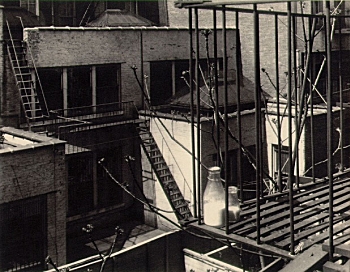 Milk Bottles: Spring
New York, 1915
Edward Steichen
March 27, 1879-March 25, 1973
______________________________________
With novels such as Clockers and now Lush Life, Price has staked his claim as one of the finest realists of this or any age.
Inner-City Muse
James Gibbons bookforum
Richard Price’s fictional North Jersey city of Dempsy has evolved, over the course of the novels Clockers (1992), Freedomland (1998), and Samaritan (2003), into a kind of Yoknapatawpha County of postindustrial blight.(...)
Price’s association with a tough brand of eye-on-the-street realism has in part persisted because the arrestingly credible portrayal of the underclass in his novels—instead of the caricatures in most movies and television and much of what now passes for news—made him an obvious choice to write several fine episodes of HBO’s The Wire. A superlative marriage of storytelling and thinly veiled reportage, The Wire anatomizes the slow death of an American city (Baltimore, a sort of Dempsy-on-the-Chesapeake) from the vantage of a godlike sociologist; it offers the rare aesthetic experience in which tendentiousness actually feeds and sustains dramatic and novelistic satisfactions. Price’s own fiction, however, operates somewhat differently, even if its depiction of what used to be called “the other America” is in tune with many of The Wire’s dispiriting conclusions. (...)
In Lush Life, Price’s preoccupation with place and home is brought to a setting whose range of significance extends well beyond the merely personal resonances of a longtime resident or returning native son. As everyone knows, the Lower East Side isn’t, or isn’t just, geography; it is also a signifier, a fantasy, an accoutrement of identity (and its debased cousin, hipness), and a repository of nostalgia.... (more)
______________________________________
 Friederike Mayröcker
photo - Barbara Klemm
More on Friederike Mayröcker's brütt, or The Sighing Gardens
John Latta
______________________________________
The Intertwining - The Chiasm [PDF]
Maurice Merleau-Ponty
from The Visible and the Invisible
We understand then why we see the things themselves, in their places, where they are, according to their being which is indeed more than their being-perceived - and why at the same time we are separated from them by all the thickness of the look and of the body; it is that this distance is not the contrary of this proximity, it is deeply consonant with it, it is synonymous with it. It is that the thickness of flesh between the seer and the thing is constitutive for the thing of its visibility as for the seer of his corporeity; it is not an obstacle between them, it is their means of communication. It is for the same reason that I am at the heart of the visible and that I am far from it: because it has thickness and is thereby naturally destined to be seen by a body. What is indefinable in the quale, in the color, is nothing else than a brief, peremptory manner of giving in one sole something, in one sole tone of being, visions past, visions to come, by whole clusters. I who see have my own depth also, being backed up by this same visible which I see and which, I know very well, closes in behind me. The thickness of the body, far from rivaling that of the world, is on the contrary the sole means I have to go unto the heart of the things, by making myself a world and by making them flesh.(...)
In advance every vision or very partial visible that would here definitively come to naught is not nullified (which would leave a gap in its place), but, what is better, it is replaced by a more exact vision and a more exact visible, according to the principle of visibility, which, as though through a sort of abhorrence of a vacuum, already invokes the true vision and the true visible, not only as substitutes for their errors, but also as their explanation, their relative justification, so that they are, as Husserl says so aptly, not erased, but "crossed out."… Such are the extravagant consequences to which we are led when we take seriously, when we question, vision. And it is, to be sure, possible to refrain from doing so and to move on, but we would simply find again, confused, indistinct, non-clarified, scraps of this ontology of the visible mixed up with all our theories of knowledge, and in particular with those that serve, desultorily, as vehicles of science. We are, to be sure, not finished ruminating over them. Our concern in this preliminary outline was only to catch sight of this strange domain to which interrogation, properly so-called, gives access.... thanks to Kirsten Zwinjenburg ______________________________________
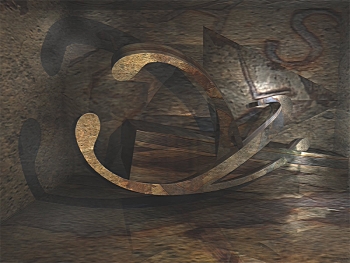 two whys
Peter Ciccariello
Invisible Notes
______________________________________
"There is no information, only transformation"
An Interview with Bruno Latour
Hybrid Workspace, Documenta X, Kassel
August 16, 1997
Digitality is the extension, one step further of mobile types. It is not a revolutionairy element. The moving pixel is added to the movable type. I always react negatively against the idea that technology is a foreign body inside the humane. It does not come from another planet, it is highly socialized and connected with a long history. Negating this typifyes the danger of techno-enthousiasm. (...)
There is a heritage of the iconoclastic dispute, which is nowadays renewed around this notion of the overload of images. Lots of images were destroyed because people were overloaded. That was exactly Luthers argument. Too many images which hide the important features which is itself not visible. My argument is an iconophilic one, which is always the opposite. One image, isolated from the rest, freeze framed from the series of transformation has no meaning. ... Being iconophilic means following the flow of images, without believing that they carry information. It is neither iconoclastic in the sense of: let us get rid of the image because what we want to access is the invisible, the innefable. On the contrary. If we follow the logic of the images, they themselves pass into one other image. Images demonstrate transformation, not information.... (more) ______________________________________
 unkown
from my grandfather's album
______________________________________
some videos in memoriam Jonathan Williams--
collected by Peter Culley
 Domestic Landscapes
Bert Teunissen
A Conversation with Bert Teunissen
concientious ______________________________________
Socialist writer and textile artist William Morris said, “You can't have art without resistance in the materials.” Blessed and burdened with the most malleable medium in human history, we are overwhelmed by a surfeit of dross, battered by chatter. There are benefits to gain by adding, in the form of constraints, some resistance to the materials. - No Resistance Is Futile
Paul Ford
A Brief Message
______________________________________
The New York University Division of Libraries and the Institute for the Future of the Book (IFB) have formed a partnership to build digital infrastructure for 21st century scholarly communications - the process by which scholars share and publish their research for the benefit of the academic community. IFB is a small “think-and-do tank” dedicated to shaping the future of reading, writing, and publishing in the networked age.
press release
if:book
A basic breakdown of what this means:
— NYU is now our technical home. All IFB sites are running out of there with IT support from the NYU Libraries' top-notch team.
— Bob, Dan and I will serve as visiting scholars at NYU.
— With recently secured NEH digital humanities start-up funding (along with other monies yet to be raised), we will work with the NYU digital library team, headed by James Bullen, to develop social networking tools and infrastructure for MediaCommons. This will serve as applied research for digital tools and frameworks that NYU is presently developing.
— We will work with NYU librarians, with the digital library team, and with Monica McCormick, the Libraries’ program officer for digital scholarly publishing, to create forums for collaboration and to develop specific projects and digital initiatives with NYU faculty, and possibly NYU Press.
______________________________________
from
Elegiac Feelings American
for the dear memory of Jack Kerouac
Gregory Corso
The American
alien in America is a bitter truncation; and even
this elegy, dear Jack, shall have a butchered
tree, a tree beaten to a pulp, upon which it'll be
contained—no wonder no good news can be
written on such bad news—
How alien the natural home, aye, aye, how dies the tree when
the ground is foreign, cold, unfree—The winds
know not to blow the seed of the Redwood where
none before stood; no palm is blown to Oregon,
how wise the wind—Wise
too the senders of the prophet. . . knowing the
fertility of the designated spot where suchmeant
prophecy be announced and answerable—the
sower of wheat does not sow in the fields of cane;
for the sender of the voice did also send the ear.
And were little Liechtenstein, and not America, the
designation. . . surely then we'd the tongues of
Liechtenstein—
Was not so much our finding America as it was America finding
its voice in us; many spoke to America as though
America by land-right was theirs by law-right
legislatively acquired by materialistic coups of
wealth and inheritance; like the citizen of society
believes himself the owner of society, and what he
makes of himself he makes of America and thus when
he speaks of America he speaks of himself, and quite
often such a he is duly elected to represent what he
represents. . . an infernal ego of an America
... (more)
Gregory Corso Selected Poems
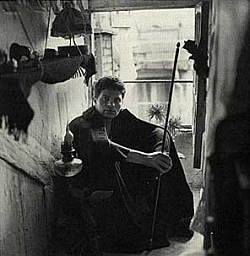 Gregory Corso
(March 26, 1929 – January 17, 2001)
A Tibute to Gregory Corso
Woodstock Journal
Corso videos
Gregory Corso: Last Of The Beats
David Dalton
Gadfly Online
Poet Gregory Corso -- Last of Beat Triumvirate .....................................................................
some google books
Herald of the Autochthonic Spirit
Gregory Corso
An Accidental Autobiography: The Selected Letters of Gregory Corso The Happy Birthday of Death
Gregory Corso
______________________________________
Killing Civilians: Method, Madness and Morality in War
Hugo Slim
reviewed in the Economist
via Blog Them Out of the Stone Age
______________________________________
Counter-Revolution of the Word:
the Conservative Attack on Modern Poetry, 1945-1960
Alan Filreis
Extensive excerpts provided by Charles Bernstein
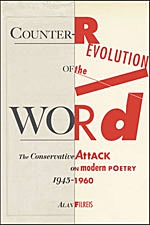 Anticommunist antimodernists sought to deny the assumption that aesthetic progress required formal experimentation, and they sought to find a way, any way (even a crude, straightforwardly political way) of dubbing the verse of formal experiment “bad poetry”; and finally they sought to enact a permanent “restoration of the language,” an heroic counterrevolutionary act that required suppression of the avant-garde and even the idea of an avant-garde. Restoration meant (somehow) taking poetic language “back” to a (fantasized) moment in literary history just prior to its affiliation with extra-poetic modes, an affiliation modernism’s anticommunist detractors blamed on the way American poets—and intellectuals generally—of the 1930s had allegedly coopted the free, unfettered, individualistic creative geniuses of the 1910s and 1920s. Anticommunism provided the most effective means by which modernism’s enemies could set up a permanent opposition between writing on one hand that “utters the everlasting language of poetry” and, on the other hand, writing that cannot go “beyond experimentation” to poetic tradition and thus invited the reasonable American reader to wonder “if it utters any language at all.” Anticommunism offered an ideological mechanism by which the antimodernist could deny modern poetry its status as language. That is the story told in the second half of this book, and it leads, in the final chapter, to a survey of the resistance against modernism put up by purveyors of the primary fetishism—namely, grammar—that operated by political analogy in reactionary language.... (more) Anticommunist antimodernists sought to deny the assumption that aesthetic progress required formal experimentation, and they sought to find a way, any way (even a crude, straightforwardly political way) of dubbing the verse of formal experiment “bad poetry”; and finally they sought to enact a permanent “restoration of the language,” an heroic counterrevolutionary act that required suppression of the avant-garde and even the idea of an avant-garde. Restoration meant (somehow) taking poetic language “back” to a (fantasized) moment in literary history just prior to its affiliation with extra-poetic modes, an affiliation modernism’s anticommunist detractors blamed on the way American poets—and intellectuals generally—of the 1930s had allegedly coopted the free, unfettered, individualistic creative geniuses of the 1910s and 1920s. Anticommunism provided the most effective means by which modernism’s enemies could set up a permanent opposition between writing on one hand that “utters the everlasting language of poetry” and, on the other hand, writing that cannot go “beyond experimentation” to poetic tradition and thus invited the reasonable American reader to wonder “if it utters any language at all.” Anticommunism offered an ideological mechanism by which the antimodernist could deny modern poetry its status as language. That is the story told in the second half of this book, and it leads, in the final chapter, to a survey of the resistance against modernism put up by purveyors of the primary fetishism—namely, grammar—that operated by political analogy in reactionary language.... (more)
______________________________________
Canons of Dissent:
Anarchy, the "Cold War" Canon, and the Anti-Statist Left in the United States
James Patrick Brown
Class, Culture, and Public Intellectuals
a Special Issue of Reconstruction
As our contributors demonstrate, for those people interested in mapping out alliances with the broader public to transform society, the decades around the 1930s provide a rich territory to revisit.
______________________________________
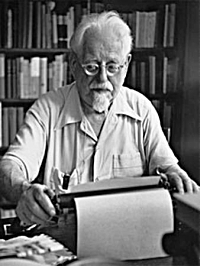 Rudolf Rocker
March 25, 1873 - September 19, 1958
The Anarcho-Syndicalist Thought of Rudolf Rocker
The Reproduction of Daily Life
Rudolf Rocker
However fully man may recognise cosmic laws he will never be able to change them, because they are not his work. But every form of his social existence, every social institution which the past has bestowed on him as a legacy from remote ancestors, is the work of men and can be changed by human will and action or made to serve new ends. Only such an understanding is truly revolutionary and animated by the spirit of the coming ages. Whoever believes in the necessary sequence of all historical events sacrifices the future to the past. He explains the phenomena of social life, but he does not change them. In this respect all fatalism is alike, whether of a religious, political or economic nature. Whoever is caught in its snare is robbed thereby of life's most precious possession; the impulse to act according to his own needs. It is especially dangerous when fatalism appears in the gown of science, which nowadays so often replaces the cassock of the theologian; therefore we repeat: The causes which underlie the processes of social life have nothing in common with the laws of physical and mechanical natural events, for they are purely the results of human purpose, which is not explicable by scientific methods. To misinterpret this fact is a fatal self-deception from which only a confused notion of reality can result.
______________________________________
 Emily Carr
with Sunshine and Tumult
c. 1936
Photo Harold Mortimer-Lamb
.....................................................................
L'America: Woman, Artist, Landscape Frida Kahlo, Georgia O'Keeffe and Emily Carr Painters as Theorists of the National Imaginary Paula Rabinowitz reconstruction
Abstract: Visual artists are open to assessment as progressive public intellectuals. Drawing on three case studies – Frida Kahlo, Georgia O’Keeffe and Emily Carr – this essay considers the strategies of rhetoric and (self)-representation used to position the artist as a personification of a range of political and social identities, including historically specific forms of nationalism.
Regarding Emily
Taking a fresh look at Emily Carr
Rachel Giese
______________________________________
Idols and False Notions
Francis Bacon (1561-1626)
The idols and false notions which have already preoccupied the human understanding, and are deeply rooted in it, not only so dominate men's minds that they become difficult of access, but even when access is obtained will again meet and trouble us in the renovation of the sciences, unless mankind when forewarned guard themselves with all possible care against them.
The idols of the tribe are inherent in human nature and the very tribe or race of man; for man's sense is falsely asserted to be the standard of things; on the contrary, all the perceptions both of the senses and the mind bear reference to man and not to the universe, and the human mind resembles those uneven mirrors which impart their own properties to different objects, from which rays are emitted and distort and disfigure them.
The idols of the den are those of each individual; for everybody (in addition to the errors common to the race of man) has his own individual den or cavern, which intercepts and corrupts the light of nature, either from his own peculiar and singular disposition, or from his education and intercourse with others, or from his reading and the authority acquired by those whom he reverences and admires, or from the different impressions produced on the mind, as it happens to be preoccupied and predisposed, or equable and tranquil, and the like; so that the spirit of man (according to its several dispositions) is variable, confused, and, as it were, actuated by chance; and Heraclitus said truly that men search for knowledge in lesser worlds, and not in the greater or common world.
There are also idols formed by the reciprocal intercourse and society of man with man, which we call idols of the market, from the commerce and association of men with each other; for men converse by means of language, but words are formed at the will of the generality, and there arises from a bad and unapt formation of words a wonderful obstruction to the mind. Nor can the definitions and explanations with which learned men guard and protect themselves in some instances afford a complete remedy—words still manifestly force the understanding, throw everything into confusion, and lead mankind into vain and innumerable controversies and fallacies.
Lastly, there are idols which have crept into men's minds from the various dogmas of peculiar systems of philosophy, and also from the perverted rules of demonstration, and these we denominate idols of the theatre: for we regard all the systems of philosophy hitherto received or imagined, as so many plays brought out and performed, creating fictitious and theatrical worlds. Nor do we speak only of the present systems, or of the philosophy and sects of the ancients, since numerous other plays of a similar nature can be still composed and made to agree with each other, the causes of the most contradictory errors being generally the same. Nor, again, do we allude merely to general systems, but also to many elements and axioms of sciences which have become inveterate by tradition, implicit credence, and neglect.
Humanistic Texts
______________________________________
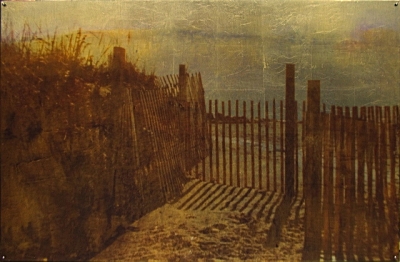 Dorothy Simpson Krause The landscapes between photography and painting
Dorothy Simpson Krause
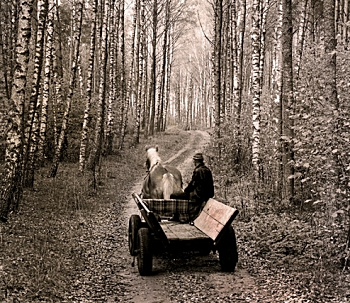 ready for the rise
Roman Loranc 1 2 3 4 Interview with Roman Loranc
______________________________________
Arcadia
Friederike Mayröcker
half-open the lean-to window traveller’s joy above the garden’s
archways, what was that name on the phone NOVELLO spoken very
rapidly then smudged, etc., outside sweet and fit to
break, from Artic circle, writes Sirkka K, where it’s so
warm and singular the trees yellow red, outside beyond the window
in the garden the crickets are making music quite audibly if you
hang a bit loose – we
sleep in rucksacks i.e. outside with children and tomato
pulp. The stars only somewhat mislaid : slipped southwards, the south of
the insane and outlandish. Am quite resigned, creep wholly / halfly into my
fur, on the reverse of these hills 1 sun askew surrounded
by sleep 1 sun with penumbra it must be deceptive, no
birds so covered-up in the trees’ cones : before a sm.audience the
philharmonic, the sun is milky the sky, back then
when we saw “Hiroshima mon amour” we were at a loss, back then
4 decades back, but my hand has dissembled on me, in my dream last
night flew blissfully or else glided on roller-skates, mother’s brain
apostrophe : areas, grown ever smaller . . was clothed in sm.lace-
dress, where red waterfall : Lassingfall / Ötschergräben with
Guido and Egon the two twin children, back then when the Feldparthien
by Joseph Haydn
—Translated from the German by Richard Dove
Friederike Mayröcker poemsGreen Integer Review
______________________________________
Reading Friederike Mayröcker’s brütt, or The Sighing Gardens
John Latta
Vatic voice as claw in the lingual firmament, I do love it so. ______________________________________
Let me tell you something about meditation. At the absolute center, is the vortex we are spun from like clay, there is a shaping hand which is neither Godlike nor peaceful as you imagine.
— Forrest Gander, "The Violence Of The Egg"
______________________________________
Bird With Two Right Wings
Lawrence Ferlinghetti
And now our government
a bird with two right wings
flies on from zone to zone
... (more)
 Lawrence Ferlinghetti
b. March 24, 1919
From Americus, Book I
Lawrence Ferlinghetti
To summarize the past by theft and allusion
With a parasong a palimpsest
A manuscreed writ over
A graph of consciousness at best
A consciousness of felt life
A rushing together
Of the raisins of wrath
Of living and dying
The laughter and forgetting
The maze and amaze of life.
______________________________________
The Dark Annniversary of My Lai
From Pinkville to Iraq
Ed Ruggero
This March we should remember that we can still "lose" these wars: Vietnam, Iraq, Afghanistan. We lose them by forgetting that the cast of characters includes villains as well as heroes. We lose them if we forget that we aren't always the good guys. We lose them when we can't muster the courage to confront our own worst selves. We lose them when we stick our veterans into simple categories: well-adjusted, crazy. We lose wars when we sanitize them, when we create myths that lack the obscenity and evil of the real thing.
And when we "lose" a war this way, it makes it easier to start the next one.
______________________________________
 Philip Jones Griffiths
1936 - 2008
Presence Of Mind: The Photographs of Philip Jones Griffiths
interview by William Messer for Aperture (magazine)
Agent Orange
"Collateral Damage" in Viet Nam
Philip Jones Griffiths
Vietnam Inc.
Phillip Jones Griffiths
The Vietnamization of Philip Jones Griffiths
Peter Howe
______________________________________
Re-engage! America and the World After Bush
a new book by Helena Cobban
______________________________________
... just how liberal will Obama be as president? His enthralled throng hasn't even stopped clapping long enough to ask the question.
... my work leads me into a frustrating dichotomy. At some points of the day I concern myself with the often trivial distinctions we make between candidates. But then, moments later, I find myself facing news that glaciers are in their worst shape in 5,000 years, that the Iraq War may cost $1 trillion, that Bush has assaulted the Constitution again, and that the financial markets are in their worst shape in decades. And none of the candidates who stand a chance of being elected - McCain, Clinton or Obama - have anything useful or meaningful to say on such topics.
And I am reminded once again why I can't bring myself to cheer.
- Sam Smith
______________________________________
An Election Without Meaning
Peter Phillips
Will November 2008 bring a meaningful change to America? Will getting rid of George W. Bush and Richard Cheney without impeachment or indictment really make a difference? Will a 600 billion dollar war/defense budget be cut in half and used for desperately needed domestic spending? Will the ninety-three billion dollars profits in the private health insurance companies—those parasitic intermediates between you and your doctor—be used instead for full health care coverage for all? Will Habeas Corpus and Posse Comitatus be restored to the people? Will torture stop and the US withdraw from Iraq immediately? Will all students in public universities be able to enroll for free? Will the US national security agencies stop mass spying on our personal communications? Will the neo-conservative agenda of total military domination of the world be reversed?... (more)
______________________________________
Custodians of chaos
Kurt Vonnegut
Extracted from A Man Without a Country: A Memoir of Life in George W Bush's America
For some reason, the most vocal Christians among us never mention the Beatitudes. But, often with tears in their eyes, they demand that the Ten Commandments be posted in public buildings. And of course that's Moses, not Jesus. I haven't heard one of them demand that the Sermon on the Mount, the Beatitudes, be posted anywhere. "Blessed are the merciful" in a courtroom? "Blessed are the peacemakers" in the Pentagon?(...)
What can be said to our young people, now that psychopathic personalities, which is to say persons without consciences, without senses of pity or shame, have taken all the money in the treasuries of our government and corporations, and made it all their own?... (more) ______________________________________

Irish Stories
Brad Temkin via Heading East ______________________________________
End of Fantasy
Cesare Pavese
translated by Linh Dinh
This body won't start again. Touching his eye sockets
one feels a heap of earth is more alive,
that the earth, even at dawn, does not keep itself so quiet.
But a corpse is the remains of too many awakenings.
We only have this power: to start
each day of life—before the earth,
under a silent sky—waiting for an awakening.
One is amazed by so much drudgery at dawn;
through awakening within awakening a job is done.
But we live only to shudder
at the labor ahead and to awaken the earth one time.
It happens at times. Then it quiets down along with us.
If touching that face the hand would not shake—
if the live hand would feel alive touching it—
if it's true that that cold is only the cold
of the earth, frozen at dawn,
perhaps it'd be an awakening, and things that keep quiet
under the dawn, would speak up again. But my hand
trembles, and of all things resembles a hand
that doesn't move.
At other times waking up at dawn
was a dry pain, a tear of light,
even a deliverance. The stingy word
of the earth was cheerful, for a brief moment,
and to die was to go back there again. Now, the waiting body
is what remains of too many awakenings and doesn't return to the earth.
They don’t even say it, the hardened lips.
Cesare Pavese
translated by Linh Dinhmilk
______________________________________
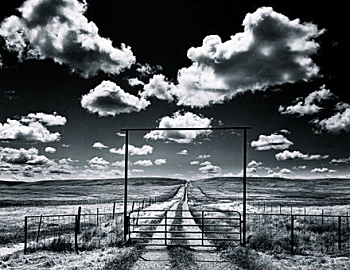 Private Road With Clouds
Roman Loranc
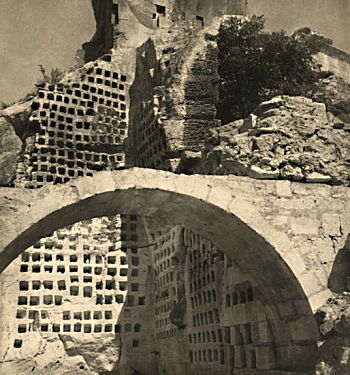 The Fortress at Les-Baux-de-Provence
Laure Albin-Guillot
1879-1962 1 2 3
______________________________________
Between story and truth
Jean-Luc Nancy
Translated by Franson Manjali
One day, the gods retreated. On their own, they retreated from their divinity, that is to say, from their presence. What remains of their presence is what remains of all presence when it absents itself: what remains is what one can say about it. What can be said about it is what remains when one can no longer address it: neither speak to it, nor touch it, nor see it, nor give it a present.
(One might even say that the gods retreated because one no longer gives a present to their presence: no more sacrifice, no more oblation, except by way of custom or imitation. One has other things to do: write, for example, calculate, do business, legislate. Deprived of presents, presence has retreated.)(...)
Between literature and philosophy there is lack of this entwinement, this embracing, this sacred mingling of man with God, that is to say, with animal, with plant, with lightning, and with the rock. The separation between them is indeed that of untwining, unclasping. The mingling that is thus unmingled is divided by the sharpest of blades: but the cut itself forever shows the effects of the entanglement. Between the two, there is something that cannot be disentangled.
Truth and narration are separated in such a manner that it is their separation that installs them as one and the other. Without the separation, there would be neither truth nor narration: there would be the divine body.
Not only is narration susceptible to or suspected of lacking in truth, but it is deprived of it by principle, being deprived of the body present as its own enunciation, its own exposition.(...)
Between the figure and the dazzlement remains the absent body of God. What remains is a singular body of absence, which is approached from every side by narration and the perspective of truth. The former describes the shape of the body, and the latter inscribes its excavation. Between what is described and what is inscribed, there is only writing (l’écrit), the interminable graph engraved on the lead of a seal affixed on the site of the retreat. The scene is played around an empty tomb, a hollow mummy, a portrait resembling no one: around a body henceforth displayed and declared as "body", that is to say, as absent outside.(...)
Do not abandon the bodies, even if the work is to be shunned. Such is the task. Do not abandon the bodies of gods without wanting to call back their presence. Do not abandon the service of truth nor that of the figure, without however, filling up with meaning the gap that separates the two. Do not abandon the world, which becomes always more world, more under the spell of absence, more in interval, incorporeal, without saturating it with signification, revelation, proclamation or apocalypse. The absence of gods is the condition for both literature and philosophy to be in. It is the in-between which legitimates the one and the other, both of which are irreversibly atheological. But they both have the responsibility of taking care of the in-between: of guarding its open body, and of allowing it the possibility of this opening.... (more) ______________________________________
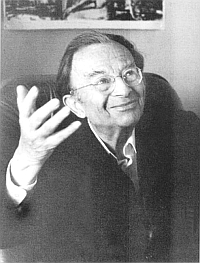 Erich Fromm
March 23, 1900 – March 18, 1980
Photograph by Theo Goldmann
1980
"One cannot be deeply responsive to the world without being saddened very often."
-
Erich Fromm
Erich Fromm: Biography
Douglas Kellner
Erich Fromm Archive Erich Fromm videos
The Two Voices of Erich Fromm: The Prophetic and the Analytic
Michael Maccoby
Fromm, Freud, and Midrash
Elliot B. Gertel
Judaism, Fall, 1999
______________________________________
Words of Light: Theses on the Photography of History
Eduardo Cadava
full text download at Fark Yaralri
Written in the form of theses--what Cadava calls "snapshots in prose"--the book memorializes Benjamin's own thetic method of writing. It enacts a mode of conceiving history that is neither linear nor successive, but rather discontinuous--constructed from what Benjamin calls "dialectical images." In this way, it not only suggests the essential rapport between the fragmentary form of Benjamin's writing and his effort to write a history of modernity but it also skillfully clarifies the relation between Benjamin and his contemporaries, the relation between fascism and aesthetic ideology. It gives us the most complete picture to date of Benjamin's reflections on history.
- renc-u-ana
______________________________________
 John Heartfield
1932
______________________________________
War Is The Health Of The State
Randolph Bourne
1918
Bureau of Public Secrets
The moment war is declared, however, the mass of the people, through some spiritual alchemy, become convinced that they have willed and executed the deed themselves. They then, with the exception of a few malcontents, proceed to allow themselves to be regimented, coerced, deranged in all the environments of their lives, and turned into a solid manufactory of destruction toward whatever other people may have, in the appointed scheme of things, come within the range of the Government’s disapprobation. The citizen throws off his contempt and indifference to Government, identifies himself with its purposes, revives all his military memories and symbols, and the State once more walks, an august presence, through the imaginations of men. Patriotism becomes the dominant feeling, and produces immediately that intense and hopeless confusion between the relations which the individual bears and should bear toward the society of which he is a part.(...)
War is the health of the State. It automatically sets in motion throughout society those irresistible forces for uniformity, for passionate cooperation with the Government in coercing into obedience the minority groups and individuals which lack the larger herd sense. (...)
in general, the nation in wartime attains a uniformity of feeling, a hierarchy of values culminating at the undisputed apex of the State ideal, which could not possibly be produced through any other agency than war. Loyalty — or mystic devotion to the State — becomes the major imagined human value. Other values, such as artistic creation, knowledge, reason, beauty, the enhancement of life, are instantly and almost unanimously sacrificed, and the significant classes who have constituted themselves the amateur agents of the State are engaged not only in sacrificing these values for themselves but in coercing all other persons into sacrificing them....... (more)
______________________________________
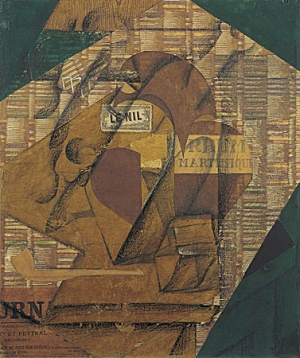 Bottle of Rum and Newspaper
June 1914
Juan Gris
March 23, 1887 - May 11, 1927
,
______________________________________
Rune
Peter Van Toorn
There’s a rumour that starts like a rune
in the earth, seeding the tunnels of bones;
then travels away like a tune–
commuting by wind through every season,
working its way into the blood:
a heresy even the rains applaud
most recklessly...From warbling grass a young
boy takes it–like a frog, a bird, a song
or a stone; takes it home, holds it like light
in butterfly fingers; keeps it close,
under a pillow. Dreams it. Never knows
(till he dreams it at the speed of light)
how it can crush the skull’s tiny glass,
change the balance of grass,
or float its blossoms on the rickety
evening surf...If it travels alone
like a song in a box, it’s an echo
muffled by mould; or runs like a clock
but keeps changing time, it’s a walk
in somebody’s bones. Even the blind can see
it opens and closes and lives on like snow.
Frogs croak it, birds fly it, and songs referee.
In a poem it boasts all colours of the sun.
Like a bronze Pope, it salutes no one.
Peter Van Toorn - Six poems
jacketCanadian Poetry: Language Acts:
Anglo-Québec Poetry, 1976 to the 21st Century
Editors: Jason Camlot & Todd Swift
Jacket 34
.....................................................................
A Goose in the Caboose: Ideas on the SonnetPeter van Toorn
Take away the haiku, and the sonnet is the heartwrencher of all the fixed forms: by opening and closing the heart a little more generously than the compactness of its gesture would seem to allow, the sonnet lifts a burden.(...)
Like some mountainside hermitage snug near the mountain’s narrow top, the sonnet offers a large perspective. Yet, the sonnet is commodious in illusion only — it is not roomy inside. Its form invokes the principle of imbalance.(...)
In an attitude of rapt attention, the sonnet is both intuitive and analytic to an acute degree because it joins what it divides or finds divided. The turn represents a memory of the abyss — makes the figure a leap of faith makes — and reminds us symbolically of the strophic function of rhyme and metre in ancient Greek odes and Hebrew verse scriptures, where it signals a change in direction to dancers and singers, a modulation in theme, mood and attitude, to accommodate the wisdom of the oracle, chorus or deus ex machina, or to signal a change in tone from lyric or lamentative to prophetic or transcendent in the supplicant addressing his tribe, soul and God. So strong is this bias to the turn in poetry close to its source of divine frenzy and controlled rage, that even in the Shakespearean sonnet the Petrarchan turn occupies a residual status, like a pleat in cloth never completely removed by ironing, at about the eighth or ninth line, before it recurs emphatically in the penultimate line of the clinching couplet.... (more)
 searching for signs of spring
photo - mw ______________________________________
Anticsm!
Kevin McFadden
archipelago
Manifesto Cries...
Anticism is eight-elevenths Romanticism. Blake had he read the stalls of a public-school restroom. Wordsworth had he wandered lonely as a could and danced with folded faiths. The sly echo of the Byronic hero. Anticism arrives—like funk to a summer potato—when there’s something perverbial in the church and rotten in the state. It is shape-changing, change-shaping, a border-crosser, a gut-checker. It values listening before enlisting, twisted noting before setting it down.
Cleanse the doors of perception all you want, take the doors off the jambs: one is always hung by some frame. The way things are put is at least as important as the puttering of the putter. If the choices are self-consciousness or self-deception, Anticism considers the or.
What goes on origins in the morning, aporia in the afternoon, stupor in the evening?—The Riddle of Anticism!... (more)
______________________________________
The Powers of Horror: An Essay on Abjection
Julia Kristeva
Translated by Leon S. Roudiez
There looms, within abjection, one of those violent, dark revolts of being, directed against a threat that seems to emanate from an exorbitant outside or inside, ejected beyond the scope of the possible, the tolerable, the thinkable. It lies there, quite close, but it cannot be assimilated. It beseeches, worries, and fascinates desire, which, nevertheless, does not let itself be seduced. Apprehensive, desire turns aside; sickened, it rejects. A certainty protects it from the shameful—a certainty of which it is proud holds on to it. But simultaneously, just the same, that impetus, that spasm, that leap is drawn toward an elsewhere as tempting as it is condemned. Unflaggingly, like an inescapable boomerang, a vortex of summons and repulsion places the one haunted by it literally beside himself. When I am beset by abjection, the twisted braid of affects and thoughts I call by such a name does not have, properly speaking, a definable object. The abject is not an ob-ject facing me, which I name or imagine. Nor is it an ob-jest, an otherness ceaselessly fleeing in a systematic quest of desire. What is abject is not my correlative, which, providing me with someone or something else as support, would allow me to be more or less detached and autonomous. The abject has only one quality of the object—that of being opposed to I. If the object, however, through its opposition, settles me within the fragile texture of a desire for meaning, which, as a matter of fact, makes me ceaselessly and infinitely homologous to it, what is abject, on the contrary, the jettisoned object, is radically excluded and draws me toward the place_where meaning collapses. A certain "ego" that merged with its master, a superego, has flatly driven it away. It lies outside, beyond the set, and does not seem to agree to the latter's rules of the game. And yet, from its place of banishment, the abject does not cease challenging its master. Without a sign (for him), it beseeches a discharge, a convulsion, a crying out. To each ego its object, to each superego its abject. It is not the white expanse or slack boredom of repression, not the translations and transformations of desire that wrench bodies, nights, and discourse; rather it is a brutish suffering that, "I" puts up with, sublime and devastated, for "I" deposits it to the father's account [verse au pere—pere-uersion]: I endure it, for I imagine that such is the desire of the other. A massive and sudden emergence of uncanniness, which, familiar as it might have been in an opaque and forgotten life, now harries me as radically separate, loathsome. Not me. Not that. But not nothing, either. A "something" that I do not recognize as a thing. A weight of meaninglessness, about which there is nothing insignificant, and which crushes me. On the edge of nonexistence and hallucination, of a reality that, if I acknowledge it, annihilates me. There, abject and abjection are my safeguards.The primers of my culture. full text download available at Continental Philosophy ______________________________________
 photo - mw
______________________________________
Difference and Givenness
Deleuze's Transcendental Empiricism and the Ontology of Immanence
Levi R. Bryant
What emerges from these efforts is a metaphysics that strives to articulate the conditions for real existence, capable of accounting for the individual itself without falling into conceptual or essentialist abstraction. In Bryant's analysis, Deleuze's metaphysics articulates an account of being as process or creative individuation based on difference, as well as a challenging critique--and explanation--of essentialist substance ontologies. A clear and powerful discussion of how Deleuze's project relates to two of the most influential strains in the history of philosophy, this book will prove essential to anyone seeking to understand Deleuze's thought and its specific contribution to metaphysics and epistemology.via Larval Subjects
______________________________________
Windows Into the Night
Marcela Valdes looks at Roberto Bolaño
Unlike many passionate young readers--who knock off two books a week when they're in high school but slow down to three or four a year once adulthood hems them in--Bolaño kept reading all his life. Most authors, Bolaño's editor Jorge Herralde observed in his book For Roberto Bolaño (2006), bury themselves in their own work, losing sight of the larger field. But Bolaño loved reading the works of his contemporaries--and he loved talking about what he was reading with his friends. According to Herralde, he was that rare and beautiful animal: "an insatiable reader." This lifelong compulsion, and its fleeting gratifications, formed the foundation of Bolaño's critical rulings, many of which can be found in his posthumous collection Entre paréntesis: Ensayos, artículos y discursos (1998-2003) (Between Parentheses: Essays, Articles and Speeches).thanks to moses from an old manse
______________________________________
Nazi Literature in the Americas
Roberto Bolaño
Reviewed by John Latta
______________________________________
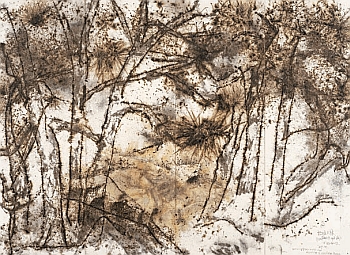 Pine Forest and Wolf
Gunpowder on paper
I Want to Believe
Cai Gui-Qiang
Guggenheim Museum via
______________________________________
Stan Brakhage with Pip Chodorov
interview took place at Stan and Marilyn Brakhage's home in British Columbia on January 4-8, 2003, two months before his death.-Genevieve Yue
Chodorov (Rail): Could you read these opening lines from your 1963 book, Metaphors on Vision, and expand on them and explain how these ideas influenced your filmmaking?
Stan Brakhage: Imagine an eye unruled by man-made laws of perspective. What a way to take it. Imagine an eye unruled by man-made laws of perspective. Our whole structure of visual thinking is based on manmade laws of perspective and so on! But imagine! I say in my youth, an eye unruled by man-made laws of perspective, an eye unprejudiced by compositional logic, an eye which does not respond to the name of everything but which must know each object encountered in life through an adventure of perception. (...)
I would rather think of what I was doing as making a snail’s trail in the moonlight. The snail knows muscularly what he or she is doing and is at one with every shift and shape of body in leaving this line of exuded spit along the rose. There’s an image for you that the poets like to pounce on, the snail smearing the leaf of the rose. But they’re just talking with words when they do that. There’s another side that’s just literal. In the moonlight one can leave a trail that can be lit by the moon, that’s soft, gentle light in the dark. Not a gloom but rather a frieze of shapes and forms. Such as Phil Solomon when he makes his Seasons, which is based on my paintings. He takes the paintings themselves and he takes them out for air, gives them air. I would rather think of myself as leaving a snail’s trail in the moonlight than of someone sitting and consciously making an art.... (more)
______________________________________
"The trauma must remain inaccessible to memory"
Trauma melancholia and other (ab-)uses of trauma concepts in literary theory. Part I
Harald Weilnböck
While humanities has by and large not taken part in or even taken note of these developments, there are a number of individuals who still make use of psychoanalytical concepts. Above all, it is the concept of psycho-trauma that has become almost fashionable in recent years, even among literary scholars whom one would least suspect of an interest in psychoanalytical perspectives. Thus, "trauma" has turned into a sort of buzzword for a small and heterogeneous group of literary critics. This, however, is not what it might seem: a sign of hope for more interdisciplinary approach. On the contrary: closer inspection reveals that this interest in trauma turns out to be a rather ambiguous phenomenon. Many of these uses are erroneous and paradoxical, distorting what psycho-trauma means in clinical terms, how it really affects individuals and society, and how best to research it. Moreover, these approaches use trauma – and in most cases even "The Trauma" – in a way that in the long run will exacerbate rather than alleviate the lack of interdisciplinary exchange between literary theory and psychology/psychoanalysis.
The main reason for this methodical yet mostly unconscious distortion of "trauma", as with any other interdisciplinary concept, is the strength of literary criticism's basic ideological belief system. Psychological concepts are appropriated, modified, and in many cases inverted in order to support rather than dissolve interpretative habits and/or cultural prejudices. These interpretative habits – for a multitude of historical and, in individual cases, biographical reasons – are of great institutional importance in the self-understanding of literary criticism. In fact, an interdisciplinary exchange with psychology is not really meant to happen, nor can it. As I shall try to demonstrate, even under circumstances of utmost mutual goodwill, interdisciplinary communication based on concepts of psycho-trauma as defined by the humanities falls short of the standards of serious interdisciplinary exchange.... (more)
______________________________________
 photo - mw ______________________________________
Rupture, Verge, and Precipice
Precipice, Verge, and Hurt Not
Carole Maso
from Break Every Rule: Essays on Language, Longing, & Moments of Desire
Let the fictions change shape, grow, accommodate. Let the medium change if it must; the artist persists.
These fragmented prayers.
Making love around the fire of the alphabet.(...)
Wish: that we not hurt each other purposely anymore.
If you say that language is dying, then what do you know of language?(...) All will perish, but not this: language opening like a rose.
And many times I have despaired over the limits of language, the recalcitrance of words that refuse to yield, won't glimmer, won't work anymore. All the outmoded forms. Yet I know it is part of it, I know that now; it's part of the essential mystery of the medium—and that all of us who are in this thing for real have to face this, address this, love this, even.
The struggles with shape, with silence, with complacency. The impossibility of the task.... (more)
.....................................................................
Reading Carole Maso
Carolyn Kuebler
"I want something else. I want there to be space enough for all sorts of accidents of beauty, revelations, kindnesses, small surprises. A space that encourages new identity constructions for the reader as well as the writer. New patterns of thought and ways of perceiving. New visions of world, renewed hope."
Carole Maso's growing body of work traces this impassioned search for "something else," each book further elucidating her desire to take fiction to new places. Maso's faith lies firmly in the possibility of language itself, and her books often take unexpected shifts and turns: erotic wordplay gives way to nursery rhyme, rage to mathematics, death song to a story of childhood. Borrowing from found materials and employing techniques from old genres, Maso creates a chaotic fluency, always in a state of ripening.... (more)
Carole Maso interiews 1 2 3______________________________________
 Francis Frith
 The Bennett place
North Carolina
John Chapman Michie
c1904
library of congress
______________________________________
An Aubade from Verlaine’s Day
Jonathan Williams
for Alfred Stieglitz
the cloud in my head
wide to the edge of the world
the level cloud
that fills the Valley of the Little Tennessee
from Ridgepole to Rabun Bald
the laughter of
the Lord God Bird
Who pecks
berries
from the
dogwood
makes these two clouds
one, one eye
open
Poems from The Language They Speak is Things to Eat
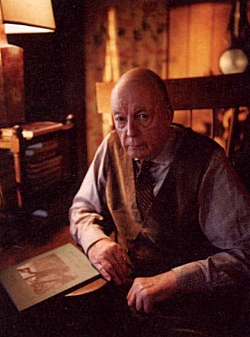 Jonathan Williams
(1929-2008)
(Photograph by Reuben Cox)
remembered by
Pierre Joris Mark Scroggins Ron Silliman
John Latta Poet, photographer and publisher Jonathan Williams dies at 79 O for a muse of fire: the iconoclasm of Jonathan Williams and the Jargon Society
profile of a Renaissance man
Tom Patterson
Afterimage, March-April, 1996
In a recent post to the Buffalo Poetics list, CA Conrad remarked that following Jonathan Williams' failing health was like watching a library slowly burn to the ground. The remark is not overstatement and the loss is heavier than most of us will immediately realize.
- damn the caesars
.....................................................................
Twenty-Seven Batting-Practice Pitches
For The John Kruk Of American Letters:An Interview With Jonathan Williams
As for “minor” versus “major,” I have always preferred the minute particulars, as someone named Bill once said. But what’s odd is, I play the Bruckner Eighth more often than I do all my Satie CDs. Most people like gilt-edge stuff, so it’s Mozart, Beethoven, world without end, money in the bank, amen! I am quite happy with exploring Eduard Tubin, or Albeniz, or Carl Ruggles. I believe in the modesty suggested by that fantastic insight of Thoreau’s: “Now I am ice, now I sorrel.” You must stay home and well out of sight in order to achieve that.(...)
...there are realms infinitely beyond Shoney’s breakfast bar and the round and square deathburgers of Dummyland. One’s aesthetic demands become very intense, and very, very particular. Listening constantly for over 50 years will only expose you to a small part of the incredible legacy of music that exists for us. It takes a long time to get to the emotional places suggested by the Adagio of the Bruckner Eighth Symphony; or able to fathom the simplicities of the unique Catalan composer, Federico Mompou, or his neighbor over the Pirineos, the gentle Gabriel Faure, of Foix, in the Ariege. And there is some music that demands much more of one’s ears than that. I remember it taking at least 25 playings of the Schonberg Violin Concerto to place it somewhat firmly in my brain. The demand was immensely rewarding. It is a staggering piece.... (more)
______________________________________
 Charles Olson
Writing The Maximus Poems
Jonathan Williams
1951 A Palpable Elysium: Portraits of Genius and Solitude
Jonathan Williams
reviewed by Mark Allen Roberts
oysterboy review
______________________________________
The Illusion of Democracy – If We Can Keep It
Peter Chamberlin
In the name of patriotism, we have participated in a planned deception to create a state of permanent war. In the name of profit, America has been sacrificed on the altar of the god of war, to create a global empire based on the mass-marketing of death.
We, along with the rest of the human race, have been set-up in a monumental con job beyond anything the world has ever seen. The "war on terror" is the biggest con of all, being the product of decades of covert actions, utilizing an engineered "terrorist" entity to bring about a state of permanent war. (Unraveling the Myth of Al Qaida). Another part of the con is the belief that we are helpless to stop the disaster we see building around us and before us. If we were really powerless to stop them, then why has it proved so difficult for them to start the war upon Iran?(...)
The truth about the great plan for our enslavement is that at least three of the major world religions have been corrupted in the process. According to plan, American Christianity has been corrupted by a contrived false doctrine known as Christian-Zionism, which embraces terrorism and genocide as the "will of God." This repeats the corruption of Judaism by secular (atheist) and Talmudic Jews, who have promoted their plan as "God's will" to "restore the land to God's chosen people," even though expressed Zionist intentions have always been to kill all those who stood in the way of them stealing another people's homeland. The "war on terrorism" which emerged from this unholy "judeo-Christian" union was centered around the creation of a false violent offshoot of Islam, termed "Islamo-fascism," to serve as an elusive permanent enemy in the grand charade.... (more)
How George W. Bush became the head of the new American Dominionist Church/StateKatherine Yurica ______________________________________
W A R S
Philip Jones Griffiths, Christopher Anderson
Paolo Pellegrin, Thomas Dworzak
Magnum In Motion
______________________________________
Triple Canopy
first issue
Not to insult the history of pamphleteering, but magazines, however beautiful and thoughtful, cost a good deal of money to print and distribute. And not to flatter the hypocrisies of the Internet, but it remains free, approximately. Of course, a rhetoric of freedom obscures a logic of control: Advertisements are everywhere, access is unequal, challenging cultural forms are crowded out by puerile and profitable ones—more or less like the rest of the world. But at least here publishing costs next to nothing.
This freeness-cum-freedom can mean many things. It can mean the Web’s easy and anodyne freedoms: the freedom to read too fast, the freedom to be unreadable. It can mean rare and strenuous ones: The disciplined freedom of form. The freedom to be excessive and recessive, polemical and lapidary, lucid and obdurate; to assume a name both overgrown and underdetermined; to foster the aesthetic and political experiences too often elided online and elsewhere ghettoized, whether in chapbooks, monographs, white cubes, black boxes, or Brooklyn living rooms. Triple Canopy is orbiting an absent program and making it visible in time. At this moment of first visibility, we are little more than our collaborators. Inertia would disperse us, centrifugally, but some centripetal force keeps us together, circling onward.
______________________________________
The Crooked Cake Of Leo Cesspooch; Or, How I Survived Bucolic Plague & Came Unto Concrete
Jonathan Williams
(1967)
To conclude, do not think there has not been a tradition of the poet as visualization, as substance, from Way Way Back. Dom Sylvester Houédard (Silver-Star-Who-Ate-Art), OSB, the distinguished, fate Kin/Kon Servo-Mechanistie Seribe of the Western Cotswolds, can clue you into Baby-Lon-Con, the peerless Saggil Kinam Ubbib, He of the Theodicy writ with a cuneiforlrl acrostic circa 1500 B.C. But, I go only A Little Ways Back: George Herbert, Blake, I,eNvis Carroll, Morgenstern, Malevich, Schwitters, Apollinaire, Bob Brown, Stein, cummings, William Carlos Williams, Patchen, Zukofsky, the Institute of Design (Chicago), Jan Tschichold, Black Mountain College, and Biederman's Art As the Evolution of Visual Knowledge since I was l8. And then there is always Pound's realization that it is the sign that constantly renews its vitality, as against themthere dim symbols. I take it--from there.... (more)
______________________________________
 Grove Park Inn fireplace
c1913
library of congress
______________________________________
My Quaker-Atheist Friend,
Who Has Come to This Meeting-House since 1913,
Smokes
& Looks Out over the Rawthey to Holme Fell
Jonathan Williams
what do you do
anything for?
you do it
for what the mediaevals would call
something like
the Glory of God
doing it for money
that doesn’t do it;
doing it for vanity,
that doesn’t do it;
doing it to justify a disorderly life,
that doesn’t do it
Look at Briggflatts here . . .
It represents the best
that the people were able to do
they didn’t do it for gain;
in fact, they must have
taken a loss
whether it is a stone next to a stone
or a word next to a word,
it is the glory-
the simple craft of it
and money and sex aren’t worth
bugger-all, not
bugger-all
solid, common, vulgar words
the ones you can touch,
the ones that yield
and a respect for the music . . .
what else can you tell ‘em?
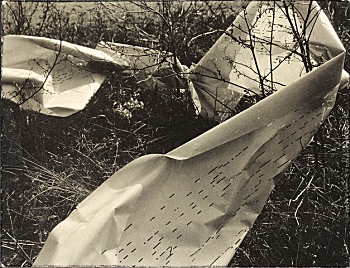 Pianola Roll
Edmund Teske
1911 - 1996 1 2 3 4
______________________________________
We're in it with Bush
It's time to rid ourselves of the fiction that the war in Afghanistan has nothing to do with the 'U.S.-led war in Iraq'
Michael Mandel
The whole campaign to keep Canadian troops fighting in Afghanistan has been desperate to distance our mission from "the U.S.-led war in Iraq." (...)
The war on Afghanistan was George W. Bush's war, not the UN's. It had no more UN authority than the war on Iraq. Both are marked by the same original sin, Nuremberg's "supreme international crime" of aggressive war. That the Security Council later succumbed in both cases, and authorized the subsequent use of force to defend (both) the American-installed governments doesn't diminish that fact, just the way it doesn't bring back the innocent dead.
(...)
...right from the beginning, the famously "UN-authorized" ISAF put itself firmly under the command of OEF: "In respect of the relationship between the International Security Assistance Force and forces operating in the Afghanistan theatre under Operation Enduring Freedom, and for reasons of effectiveness, the United States Central Command will have authority over the International Security Assistance Force" (Letter from the U.K. government to the Security Council, Dec. 19, 2001).
ISAF does not answer directly to OEF but must defer to it. That means that in essence all of the 59,250 foreign troops in Afghanistan, including 2,500 Canadians and 31,000 Americans, are under permanent American command, and every Canadian should know who the Commander-in-Chief of the American Armed Forces is (hint: it isn't Hamid Karzai). In fact, on its website, NATO makes a point of reminding everyone that "ISAF is not a UN force, but is a coalition of the willing."
How's that for "any parallel between the Afghanistan mission and the U.S.-led war in Iraq," that the Manley report was so anxious to reject?
(...)
As far as the Bush administration is concerned, Afghanistan and Iraq are one war, and we're in Afghanistan, under American command, to help them fight it.
So why the attempt to hide all of this? Maybe because the Bush approach to fighting terror with more terror (and torture and every other form of lawlessness imaginable) is a proven failure that even the Americans are fed up with (as they are with Bush himself)? Maybe because, five years into the Iraq horror show, there is more civilian blood on the hands of the Christian fundamentalist in the White House than all the Islamic fundamentalists put together? Or maybe because we've seen this movie before, when the Americans brought the fundamentalist women-haters to the "Afghan theatre" to bring down their Soviet geopolitical rivals, the people of Afghanistan be damned?... (more)
How America Gets Away with Murder: Illegal Wars, Collateral Damage and Crimes Against Humanity Michael Mandel amazon linkAfghanistan and Iraq are the Same War
David Orchard and Michael Mandel Getting Away with Murder
reviewed by Marjorie Cohn
Torture and International Human Rights
A roundtable discussion with Francis Boyle, Michael Mandel, Liz Holtzman, H. Victor Conde, and Mark Levine
______________________________________
War Made Easy: How Presidents & Pundits Keep Spinning Us To Death
"War Made Easy" reaches into the Orwellian memory hole to expose a 50-year pattern of government deception and media spin that has dragged the United States into one war after another from Vietnam to Iraq. Narrated by actor and activist Sean Penn, the film exhumes remarkable archival footage of official distortion and exaggeration from LBJ to George W. Bush, revealing in stunning detail how the American news media have uncritically disseminated the pro-war messages of successive presidential administrations.via I cite
______________________________________
Winter Soldier:
US Vets, Active-Duty Soldiers from Iraq and Afghanistan Testify About the Horrors of War
______________________________________
Things are getting very weird very fast
james howard kunstler
-- and will probably get even weirder, faster, as the train wreck of bad debt meets the Saint Paddy's Day Parade of bacchanalian excess at the grade-crossing of destiny. The train is carrying America's financial system, but the engine driving it is peak oil, because declining energy resources necessarily means declining capital wealth -- and declining value of all the institutions, instruments, and markers that denote that wealth or hope to profit by trading in it. The fiasco leads straight to the necessary reinvention of American life on other terms and by other means.(...)
Ultimately, in my view, the issue of what happens next will be settled not by the fantasies of the algae-biodiesel geeks or the wishful thinking of the sustainable futures organizers, but by the natural, self-organizing properties of a society responding 'emergently' to new circumstances. One of the implications of destiny-as-emergence is the probability that we will try any damn fool thing besides the right things to keep the old game going for a while -- even in the face of obvious failure.
I'm sure our political leaders will mount a campaign to rescue the futureless infrastructure of suburbia. It will necessarily be an exercise in futility. But it has already started. That's what the swindle of ethanol has been all about. And the touting of hybrid cars, and the flimflam of "energy independence." Even the "environmental" crowd" squanders most of its attention these days on how to keep all the cars running on something other than gasoline. They don't question the assumption that we will remain a car-dependent society.
As much as I loathe the suburbs in their grotesque late-stage efflorescence, I can understand why those stuck in them would wish to defend their misinvestments. I just hate to think of the political consequences when their disappointment catches up to the reality that the suburbs will not be rescued.... (more)
______________________________________
 Jacques Callot
1592-1635
German Emblem Books
______________________________________
Either You're With Us and Against Us:
Charles Bernstein's Girly Man, 9-11, and the Brechtian Figure of the Reader
Tim Peterson
electronic book review
Perhaps the most vociferous critic of the self, the memory poem, and the voice in previous years, Bernstein is noticeably breaking several of his own earlier rules about poetics in "Some of These Daze" and is writing for the first time in an overtly biographical and narrative style. Where are the sardonic ironies, the collage assemblage, and the multiple voices used as polemical props? Where is the implied perspective of critique? Instead we are presented with short prose paragraphs, a way of evoking bits of narrative in a process that flits between relating a clear story and figuring the process of writing ("By mistake I first wrote "Word Trade Center."). The tone seems bleaker and perhaps foggier, as if the speaker is working through the process of enduring a shock:
They thought they were going to heaven.
I find myself walking around making up arguments in my head, but when I try to write them down they dissolve in a flood of questions and misgivings. I value these questions, these misgivings, more than my analysis of the situation.
A new sport is checking not what stores have put up flags but which ones don't. Still, there is one Afghani joint in midtown that has no flag in sight. Stu and I head over to try out the lamb kebab. ("Report from Liberty Street," Girly Man, 28-29)(...)
The mobilization of queer rhetoric, iconoclastic values, and an implied notion of the family here in the figure of the Girly Man evokes once again the Brechtian figure of the reader, the ghostly presence of Marx himself. But in this situation Benjamin's stranger is no longer the potential reader of the text. For the first time, this stranger appears in the position of the speaker who utters the poem and who exhorts others to be other. In a single and ingenious stroke, Bernstein at once reveals a way out for the Left and proves that the opposite of liberalism is neither family nor morality, but Empire.... (more) Girly Man
Charles Bernstein amazon link
______________________________________
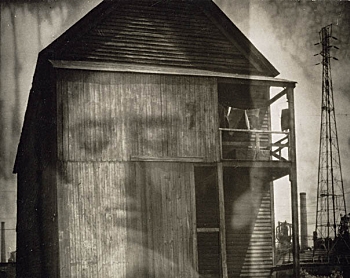 Facade
Edmund Teske
Composite with Shirley Berman Darkroom alchemist - photographer Edmund Teske
Mark Alice Durant
Art in America, Nov, 1993
______________________________________
IF NOT, NOT
Michael Palmer
They tell each other stories,
lies composed as dreams and
always in the colors of
dreams: rust, chrome yellow, coral,
chemical green. Of the dying
figures, loosely assembled, by a
riverbank. The gatehouse. A journey
by train through beautiful countryside,
indescribable countryside. I was there
cut in half, only to
survive. A young dancer, standing
at the third-floor window. Cobalt
blue, argentine, bone white. What
we called that hour in
those days. He means to
say that on that same
hill Goethe and Eckermann would
sometimes walk. "Always the old
story, always the old bed
of the sea!" He means
to say, The music of
moths, the small lamps. She
stares from the window on
the third floor, toward the
square below. He says, These
are yellow-hammers and sparrows, but
there are no larks. Come
Whitsuntide, the mockingbird and the
yellow thrush will arrive. Here
at the heart, a small
pond, stagnant in the shadow
of smoke. The late flowers.
from Four Kitaj Studies
.....................................................................
Michael Palmer writes a splendid poetry of displacement, of shifts and nomadic drifts of text through zones of page. The operative semantics is copulative, a linking (purely syntagmatically) of isolated units still preserving their molecular independency. He writes a double assault: on page per se and on the vector of reference. There is no place in his work because there largely is no referent incantated. … In Palmer’s poems there is, deliberately, no purpose. This leads to local composition, an investigation of grammatological space per se, of space as deferral, of placement and occurrence as difference. Constant, consecutive invention on the plane of the signifier.
The process of reading becomes a muscular activity of the mind operating in tension through disjunction, aborted vectors, non-purposive contexts. … Page for Palmer is the topography of the disjunctive, supporting the integral violence of transformationality. For the steady, consecutive plod of language, line after line, is at the same time its violent transformation. Such a paradox describes the horizontal identity of Palmer’s signifier: a violent stability of grapheme, being at the same time a violent instability in any molecular aggregate of "thought." The thing it is. Writing. Written. Not that linearity disappears, on the contrary, Palmer strengthens the line but only in order for it to confess more effectively its own duplicities. The worded line identifies the syntagm as a horizontal, moving segment in space possessed of the infinite capacity to absorb all breaks in casuality and consequentiality within its consecutive motions. And thus the transparent guilt of reading. The guilt of witnessing a graphed pattern of place support a huge displacement.
From Steve McCaffrey, "Michael Palmer: A Language of Language," in Bruce Andrews and Charles Bernstein, Eds. The L=A=N=G=U=A=G=E Book (Carbondale: Southern Illinois University Press, 1984), 257-258.
Politics and the Art of Reading in Michael Palmer: General Comments
.....................................................................
more poems by Michael Palmer
Dream of a Language that Speaks
Michael Palmer
To the Title (Are there titles?)
Michael Palmer
Michael Palmer at PennSound
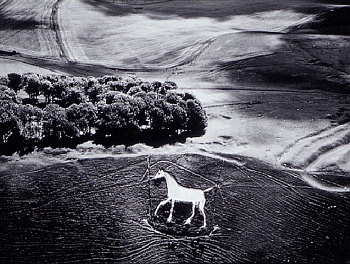 Cherhill Horse
Wiltshire, England
Marilyn Bridges 1 2
______________________________________
There is a nature that is grotesque within
The boulevards of the generals. Why should
We say that it is man's interior world
Or seeing the spent, unconscious shapes of night,
Pretend they are shapes of another consciousness?
The grotesque is not a visitation. It is
Not apparition but appearance, part
Of that simplified geography, in which
The sun comes up like news from Africa.
- Wallace Stevens, "A Word with Jose Rodriguez-Feo"
the Grotesque
David Lavery
______________________________________
Journal of Language Contact
Evolution of languages, contact and discourse
Vol. 1 (2008)
______________________________________
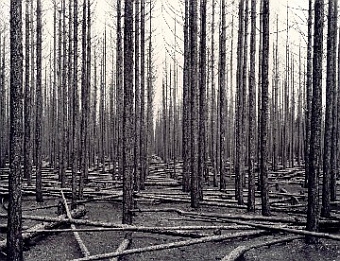 John Johns
Mcnamara Gallery
______________________________________
Home: A Conversation with Richard Powers and Tom LeClair
Scott Hermanson
... despite their investigations into the complicated ways humans relate to their environment, neither writer seems to be much recognized in green literary circles. More than anything this lack of ecocritical attention results from their respective writing styles and critical focus. Both writers are particularly concerned with literary formalism, giving prominent consideration to textual techniques that enlist the reader in consideration of language as much as the physical world. Such aesthetics are anathema to traditional nature writers and critics who have seen postmodern textual experimentation as dangerously disconnected and symptomatic of our alienation from the natural world. Indeed, the resurgence in nature writing and the relatively new field of ecocriticism has been labeled as a necessary correction to postmodern writing and theory. Sven Birkerts in an essay on the early formation of ecocriticism - " Only God Can Make a Tree: The Joys and Sorrows of Ecocriticism" - suggested this very idea. Other writers, Wendell Berry and Gary Snyder come to mind, convey a distrust of thinking about nature that isn't draped in a particular appreciation (or even worship) that arises from deep immersion in nature.
Yet this polarizing of techniques and themes unnecessarily and falsely delimits writing about nature.... (more)
______________________________________
‘To write poems is not enough if they do not keep the life that has gone’ :
a Zukofskian biography between Erlebnis and Ereignis
Nicholas Manning reviews Mark Scroggins' The Poem of A Life: A Biography of Louis Zukofksy
jacket
...it might be profitable to first situate Mark Scroggins’s extraordinary critical biography in the context of the distinction, so crucial in Heideggerien philosophy, and which the German language operates efficiently, between Ereignis and Erlebnis. Though both terms translate the English notion of ‘event’ or ‘experience’, there is an important difference. For if our idea of Erlebnis is fairly clear — something close to the English rendition of ‘lived experience’ — the proximate definition of Ereignis has proved infamously conjectural.
And so it should. For it is precisely this markedly more complex notion that Zukofsky’s poetic appears to strive so consistently to weave, to unweave, and to decorate. My question, then, is what are we to make of the detailing of the events of a ‘life’ which on the surface appears so consistently ‘uneventful’? To write a biography of Louis Zukofsky constitutes in this way a different task to the writing of a biography of his Modernist predecessors. It is no less difficult, but it is surely difficult for different reasons.... (more)
______________________________________
The Ghost In The Hologram
A Conversation at the Swans Café...
Joe Bageant, Phil Rockstroh & John Steppling
Joe Bageant
The Sixties experience made me a child of the self-realization hippie generation. There were a lot of us. I don't know if that is even possible today. Do you? The only people I am meeting who have grown their own consciousness and intellectual lives to their own specifications did it while studying in prison. Do you have to go to prison these days to get a real education?(...)
I look at the inherent meanness in my working class Christian fundamentalist relatives, and the cruelty of my community toward homelessness and poverty...the arrogant belief in their own racial and religious superiority and their willingness to kill abroad...and I am stunned. The saddest discovery of my late adulthood was that my class of people are, on the whole, the first to become Good Germans. You don't need to wear a jacket and tie and work on Wall Street to be one of what Ward Churchill calls the "Little Eichmanns." Yes, American capitalism is inflicting misery on a global scale, but it also inflicts a discipline upon its own people, or uses the threat of misery to keep them in line, to keep them working against one another and against their own interest as we saw in the last election. See, I truly believe we are becoming a sick and dangerous people, but of course, that is not a very popular notion inside the U.S.(...)
Now with the approaching death of widespread yeoman textual literacy, and the advent of technology driven quantum experience among our species, it is understandable that folks of our type are frustrated, anxious and depressed over what is ahead. Certainly the lush, funky, sexy, organic planetary experience as we have known it through human history is ending. The progression of technology is geometric, self-squaring, and what we are now witnessing is sort of a Doppler shift in which human perceptive experience approaches warp speed. The man becomes the holographic man, then the ghost in the hologram animated by the very mechanism he created, grown complex and labyrinthine and self-manifesting through man himself. Unintelligent, soulless, but self-manifesting nevertheless. I think too many idealists in our neurological caste (artists, visionaries, pimps, heart burglars, whatever) cannot grasp that the masses, the majority of modernized technical humans, find the hologram just peachy. They are made for it because they were created by it.... (more)via Dave Pollard
______________________________________
10 poems from
Reverse Oedipus
David Hickman
11.
"The senses do not deceive, but the judgment deceives."
-- Goethe
At the time, we were empty. Falling through
centuries of blindness and disdain, the orators singing what they would have
us mumble --those great ones, the speakers , who did not know personally
what they asked us to remember, or to act out daily in duty and pain.
Then the sphinx was banished. And the past gave us forms
that posed the well dressed murderers inside the official photographs.
The famous smiles. The wordless crimes inside our remembrance, echoed
by publicans and the mirrors of the chorus.
Only a few came to see beyond the official fakes and jabs, after a lifetime of
an imposed and officized regret: that the theory could not support the thing,
that the heart they had mimicked was never a pump!
FlashPøint
______________________________________
 ..................................................................... .....................................................................
Twittering machine/ Paul Klee
David Hickman
FlashPøint
We are birds in the aviary of a derelict desire,
powering a little rondelay of machinations that devour.
Little tripods prop us up
where the sky is moot, and love has forgotten
what it was born to do.
Discern this haze then. Inhale its absence.
We are tethered to our devices and cannot escape.
And our pain is a texture in which death's brigades
chatter in twilight against a thrum of engines.
______________________________________
Visualicity – on urban visibility and invisibility - [PDF]
Rob Shields
Most discussions of the visual focus on the scrutinous gaze; this stress is problematized by a focus here on this notion of ‘glimpsing’ and this sort of visual faith makes the overall city part of a ‘public secret’. The concrete actuality of the city cannot be captured in one glance, yet we routinely participate in visual games that represent cities as simple objects, conveniently seen from a single point of view. Not only do we engage in this collective fiction of seeing the whole from a part, we routinely participate in rhetorical fallacies such as understanding the probable future from what we see in the present moment in an environment or scene - for example we attempt to discern the risks of a place from how it ‘looks’ to us now. (...)
Elements such as exposure and glance exceed the merely ‘seen’ first because they include processes and strategies of representation that depart from the usual tethering of the visible to the articulable. Exposure is a reminder that the breadth of visualicity exceeds the represented, the successfully exposed. The ‘glance’ as a visual gesture straddles the future and present, directing attention to the emergent, the virtual not yet actual, becoming of the visible. The glance operates by other than the established and articulated technologies of representation that bring ‘facts’ to the stage of the focused gaze. These heuristic terms help problematize and rethink the points of orientation of visual culture. They challenge the relationship to, and between knowledge and concrete objects of the gaze.
______________________________________
 paper birch
photo - mw ______________________________________
The Translator's Ego
Clayton Eshleman
As a poet translating activity, in the context of an apprenticeship, was envisioned and critiqued as an aspect of my own evolving poetics. Over the years, I constantly tried to skim my own imaginings of Vallejo off the surface of the translations and let them ferment in my own poetry. I came to understand that if a translator does not do this, he runs the risk of building up an imaginal residue in his translation, which with no outlet of its own, spills into the text.
The thing is: Imagination is always present. We know this when we try to remember and write down a dream upon waking. As we try to remember, we forget, and in the flux we reorganize, imagining the dream into a writing that ends up locking the nebulosity of psyche into a fixed grid of print. In a similar way, our imaginations are active as we move one language into another. As we read translationally, we risk revising the original to reinforce our dream of a poetics that might hold its own against alternative poetics.
All the poets I have spent long periods of translation time with-Neruda, Vallejo, Artaud, Césaire, Deguy-have drawn me because I felt that their poetry knew something that my poetry wanted to know. Besides attempting to make accurate, readable versions, I was also involved in a secondary plot, or a sub-text, wanting to shovel some of their psychic coal into my own furnaces. ... (more)
 Blast
1914-06 - 1915-07
Blast: An Introduction
Mark Morrisson So what was Blast? Why is a little magazine that only survived to publish two issues so significant to our understanding of the modernist aesthetic revolt in London?
The Modernist Journals Project
______________________________________
The Suspect Society
Ideas
CBC Radio
The Surveillance Society. The New Authoritarianism. The Age of Paranoid Politics. These are just a few of the ways writers and thinkers describe the age we’re now living in. The signs of anxiety and fear in this post 9-11 era are all around us. School lock-downs are called the new fire-drill. Recently, many schools boards in Canada made rehearsing the lock-down mandatory. The number of security staff in schools is increasing every year. By 2010 for example, there will be more security guards than teachers in American schools. But, the uniforms aren’t just being worn by security staff. More and more American public schools have adopted uniforms for students. Meanwhile the U.S. army is embedding itself in schools - targeting younger and younger students for recruitment. In Canada recruitment comes through video games that inform, entertain and seduce “action-focused males starting at 17 years old”.
Military symbols and myths are gaining prominence in western societies. In Britain, a recent report recommended that military personnel continue to wear a uniform in their daily life as citizens to boost support for themselves. One of Canada’s military boosters is Prime Minister Stephen Harper. In April, 2007, he told us that the Battle of Vimy Ridge is Canada’s creation story. Military Heroics. Bunker politics. Us against Them. The world, indeed seems more dangerous than ever, in the most intimate of environments. In daycares within Canada, the US, Britain and Australia, there is now video surveillance of very young children, easing we’re told, parental anxieties. Never mind cameras at intersections, in elevators. Cameras everywhere. In Baltimore, they’ve gone further. Based on an idea from Glasgow, Scotland, blue flashing lights have been installed around Baltimore - to signal: this is a high-crime neighbourhood.
The Suspect Society, Part 1 [ram] runs: 54:00
______________________________________
On the Sustaining of Culture in Dark Times
Michael Palmer
Golden Handcuffs Review
Perhaps our " notes" and " keys" seem a little too aberrant, too " off," too " blue" for most occasions. It's equally possible that our modes of thought would appear too given to errancy and vagabondage, too committed to non-reason, to be entirely trustworthy in most contexts, and there may well be some justification for that assumption. I trust, at the very least, that I'm not entirely trustworthy. In any case, as a novice in this area, I'd like to begin by examining some relevant terms. Let's see after that where " poetic reason," however oxymoronic, may take us regarding the sustaining of culture at a fraught and contentious and corrupted moment in our history. And please allow me to speak with you from a certain muteness and impossibility, since words certainly don't come easily, or why else would there be poetry?..... (more) ______________________________________
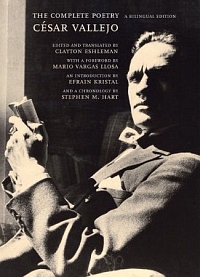 The Complete Poetry: A Bilingual Edition
César Vallejo
(March 16, 1892 - April 15, 1938)
Clayton Eshleman (Translator)
amazon link
One Man’s Vallejo
John Cotter reviews
César Vallejo: The Complete Poetry, edited and translated by Clayton Eshleman
The Poetry of César Vallejo is unparalleled in movingly capturing the dislocation and frustrated passion of the early twentieth century. He lived in a world that was violently breaking and being born, and he depicts—in his masterpiece Trilce and in his posthumous poems—the shapes reality makes when molded to the contours of an individual consciousness:
Sometimes I hit against all the againsts,
and for moments I’m the blackest height of the apexes
in the fatality of Harmony.
Or, in narrative:
I know there is a person
who looks for me in her hand, day and night,
finding me, every minute, in her shoes.
Doesn’t she know that the night is buried
with spurs behind the kitchen?
Or, more intimately:
I lose contact with the sea
when the waters come to me.
Let us always depart. Let us savor
the stupendous song, the song expressed
by the lower lips of desire.
Vallejo is a difficult poet to quote briefly because he writes with a kind of stutter: his thoughts are constantly breaking off, catching up with themselves late, contradicting. He demands the whole space of a poem to pull off his best effects. Those unable to read the second line of a poem without fully coming to terms with the first will have little truck with Vallejo. But this casual, idiosyncratic, endlessly creative course of expression is his innovation and his legacy.... (more)
TrilceCésar Vallejo
translated by Clayton Eshleman google books
César Vallejo - Ten Poems
translated by Clayton Eshleman
.....................................................................
Three Poems from 'Trilce'
César Vallejo
translated by Michael Smith & Valentino Gianuzzi
XXVII
It gives me fear, that surge,
good remembrance, strong sir, implacable
cruel sweetness. It gives me fear.
This house gives me a whole well-being, a whole
place for this not knowing where to be.
Let's not go in. It gives me fear, this favour
of returning by the minute, through blown-up bridges.
I won't go on, sweet sir,
valiant memory, sad
singing skeleton.
What content, that of this enchanted house,
gives me deaths of quicksilver, and plugs
my spurts with lead
at the dried-up here-and-now.
The surge that knows not how's it going,
gives me fear, terror.
Valiant memory, I won't go on.
Fair and sad skeleton, hiss, hiss.
... (more)
______________________________________
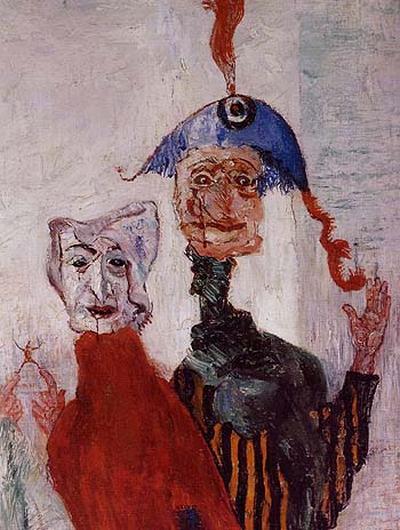 The Strange Masks
James Ensor
1892
______________________________________
Then real enemies came out of the woodwork, real uncaring, ignorant, callous bastards & bitches. I welcomed them. Step right up! What a sideshow life in America presents. Behind this curtain, the holier-than-thou fiend. Under this big-top tent, armaments manufacturers of the War Machine. (Down the street in Saco, General Dynamics just received a billion dollar contract for machine guns, making the workforce happy.) Bosch is not far off, James Ensor saw the show, don’t you love George Grosz?
- Robert Gibbons, Where I Want to Be
______________________________________
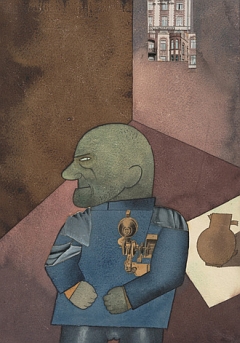 The Convict
George Grosz
ca. 1920
______________________________________
Another anniversary
The My Lai massacre
March 16, 1968
The names of the deceased are followed by their age and sex. A brief tally shows that 50 of the people were three years old or younger, 69 were between the ages of four and seven, 91 were between eight and twelve, and 27 were in their seventies or eighties.
- The 504 People Killed in the My Lai Massacre, provided by Country Joe McDonald
______________________________________
FlashPøint
Spring 2008, Web Issue 10
4 X Kent Johnson
Killers Who Read
Unmoved, they sit, stuck in their betrayal of the dead,
The History of Fascism or Mussolini, Man or Myth,
easily digesting the immortal lies of their unfeeling forebears,
except in those rare instants when their thoughts overlap
that insistence of misery, unspoken but shrieking
from every page. To become expert, to serve mammon
and murder with equal enthusiasm, to devise the means
to an end of so many, to find a darkness in which to hide
the indifferent evil they direct at total strangers: the weak,
the unprotected; and out of these grand wrecks of history
to reconstruct a fictional past to mythologize the present
recurring genocide, events necessary to manufacture the
modern nightmares in which to regress and to prosper.
______________________________________

Wax Books
Veronika Anita Teuber
via la main gauche
______________________________________
Euphemism and American Violence
David Bromwich
In Tacitus' Agricola, a Caledonian rebel named Calgacus, addressing "a close-packed multitude" preparing to fight, declares that Rome has overrun so much of the world that "there are no more nations beyond us; nothing is there but waves and rocks, and the Romans, more deadly still than these— for in them is an arrogance which no submission or good behavior can escape." Certain habits of speech, he adds, abet the ferocity and arrogance of the empire by infecting even the enemies of Rome with Roman self-deception:
A rich enemy excites their cupidity; a poor one, their lust for power. East and West alike have failed to satisfy them.... To robbery, butchery, and rapine, they give the lying name of "government"; they create a desolation and call it peace.
The frightening thing about such acts of renaming or euphemism, Tacitus implies, is their power to efface the memory of actual cruelties. Behind the façade of a history falsified by language, the painful particulars of war are lost. Maybe the most disturbing implication of the famous sentence "They create a desolation and call it peace" is that apologists for violence, by means of euphemism, come to believe what they hear themselves say.(...)
The "global war on terrorism" promotes a mood of comprehension in the absence of perceived particulars, and that is a mood in which euphemisms may comfortably take shelter. There is (many commentators have pointed out) something nonsensical in the idea of waging war on a technique or method, and terrorism was a method employed by many groups over many centuries before al-Qaeda—the Tamil Tigers, the IRA, the Irgun, to stick to recent times. But the "war on crime" and "war on drugs" probably helped to render the initial absurdity of the name to some degree normal. This was an incidental weakness, in any case. The assurance and the unspecifying grandiosity of the global war on terrorism were the traits most desired in such a slogan.(...)
nothing so much as language supplies our memory of things that came before today; and, to an astounding degree, the Bush and Cheney administration has succeeded in persuading the most powerful and (at one time) the best-informed country in the world that history began on September 12, 2001. The effect has been to tranquilize our self-doubts and externalize all the evils we dare to think of. In this sense, the changes of usage and the corruptions of sense that have followed the global war on terrorism are inseparable from the destructive acts of that war.... (more)via Jim Johnson
______________________________________
Three Poems
Suzanne Rindell
conjunctions
Killer Bees
Yet another idea of the self:
a multitude of fragments
temporarily moving as one,
each dissent a quick death,
bodies expelled from the black cloud
like the tail of a comet spitting dust.
The idea of desire as a series
of splinters, love lodged in a chain
of fixed images, a stream of faces
who in turn are each a thorn,
a fine filament of toxin under the skin.
The idea that the soul
is really only a swarm of bees,
a murderous hum in the mouth,
so sweet,
dissolving like honey.
|

















































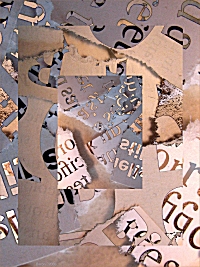

 Anticommunist antimodernists sought to deny the assumption that aesthetic progress required formal experimentation, and they sought to find a way, any way (even a crude, straightforwardly political way) of dubbing the verse of formal experiment “bad poetry”; and finally they sought to enact a permanent “restoration of the language,” an heroic counterrevolutionary act that required suppression of the avant-garde and even the idea of an avant-garde. Restoration meant (somehow) taking poetic language “back” to a (fantasized) moment in literary history just prior to its affiliation with extra-poetic modes, an affiliation modernism’s anticommunist detractors blamed on the way American poets—and intellectuals generally—of the 1930s had allegedly coopted the free, unfettered, individualistic creative geniuses of the 1910s and 1920s. Anticommunism provided the most effective means by which modernism’s enemies could set up a permanent opposition between writing on one hand that “utters the everlasting language of poetry” and, on the other hand, writing that cannot go “beyond experimentation” to poetic tradition and thus invited the reasonable American reader to wonder “if it utters any language at all.” Anticommunism offered an ideological mechanism by which the antimodernist could deny modern poetry its status as language. That is the story told in the second half of this book, and it leads, in the final chapter, to a survey of the resistance against modernism put up by purveyors of the primary fetishism—namely, grammar—that operated by political analogy in reactionary language.
Anticommunist antimodernists sought to deny the assumption that aesthetic progress required formal experimentation, and they sought to find a way, any way (even a crude, straightforwardly political way) of dubbing the verse of formal experiment “bad poetry”; and finally they sought to enact a permanent “restoration of the language,” an heroic counterrevolutionary act that required suppression of the avant-garde and even the idea of an avant-garde. Restoration meant (somehow) taking poetic language “back” to a (fantasized) moment in literary history just prior to its affiliation with extra-poetic modes, an affiliation modernism’s anticommunist detractors blamed on the way American poets—and intellectuals generally—of the 1930s had allegedly coopted the free, unfettered, individualistic creative geniuses of the 1910s and 1920s. Anticommunism provided the most effective means by which modernism’s enemies could set up a permanent opposition between writing on one hand that “utters the everlasting language of poetry” and, on the other hand, writing that cannot go “beyond experimentation” to poetic tradition and thus invited the reasonable American reader to wonder “if it utters any language at all.” Anticommunism offered an ideological mechanism by which the antimodernist could deny modern poetry its status as language. That is the story told in the second half of this book, and it leads, in the final chapter, to a survey of the resistance against modernism put up by purveyors of the primary fetishism—namely, grammar—that operated by political analogy in reactionary language.